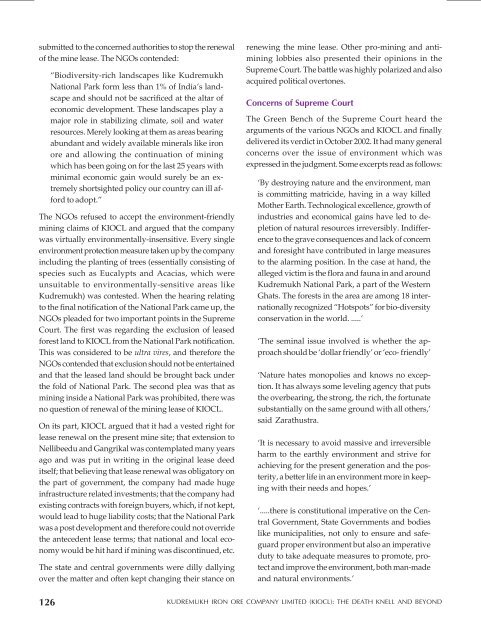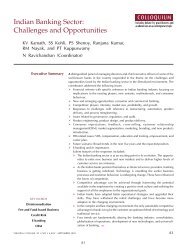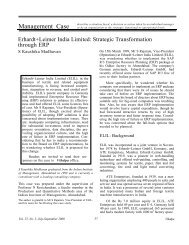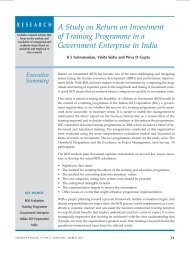Kudremukh Iron Ore Company Limited (KIOCL): The Death ... - Vikalpa
Kudremukh Iron Ore Company Limited (KIOCL): The Death ... - Vikalpa
Kudremukh Iron Ore Company Limited (KIOCL): The Death ... - Vikalpa
Create successful ePaper yourself
Turn your PDF publications into a flip-book with our unique Google optimized e-Paper software.
submitted to the concerned authorities to stop the renewal<br />
of the mine lease. <strong>The</strong> NGOs contended:<br />
126<br />
“Biodiversity-rich landscapes like <strong>Kudremukh</strong><br />
National Park form less than 1% of India’s landscape<br />
and should not be sacrificed at the altar of<br />
economic development. <strong>The</strong>se landscapes play a<br />
major role in stabilizing climate, soil and water<br />
resources. Merely looking at them as areas bearing<br />
abundant and widely available minerals like iron<br />
ore and allowing the continuation of mining<br />
which has been going on for the last 25 years with<br />
minimal economic gain would surely be an extremely<br />
shortsighted policy our country can ill afford<br />
to adopt.”<br />
<strong>The</strong> NGOs refused to accept the environment-friendly<br />
mining claims of <strong>KIOCL</strong> and argued that the company<br />
was virtually environmentally-insensitive. Every single<br />
environment protection measure taken up by the company<br />
including the planting of trees (essentially consisting of<br />
species such as Eucalypts and Acacias, which were<br />
unsuitable to environmentally-sensitive areas like<br />
<strong>Kudremukh</strong>) was contested. When the hearing relating<br />
to the final notification of the National Park came up, the<br />
NGOs pleaded for two important points in the Supreme<br />
Court. <strong>The</strong> first was regarding the exclusion of leased<br />
forest land to <strong>KIOCL</strong> from the National Park notification.<br />
This was considered to be ultra vires, and therefore the<br />
NGOs contended that exclusion should not be entertained<br />
and that the leased land should be brought back under<br />
the fold of National Park. <strong>The</strong> second plea was that as<br />
mining inside a National Park was prohibited, there was<br />
no question of renewal of the mining lease of <strong>KIOCL</strong>.<br />
On its part, <strong>KIOCL</strong> argued that it had a vested right for<br />
lease renewal on the present mine site; that extension to<br />
Nellibeedu and Gangrikal was contemplated many years<br />
ago and was put in writing in the original lease deed<br />
itself; that believing that lease renewal was obligatory on<br />
the part of government, the company had made huge<br />
infrastructure related investments; that the company had<br />
existing contracts with foreign buyers, which, if not kept,<br />
would lead to huge liability costs; that the National Park<br />
was a post development and therefore could not override<br />
the antecedent lease terms; that national and local economy<br />
would be hit hard if mining was discontinued, etc.<br />
<strong>The</strong> state and central governments were dilly dallying<br />
over the matter and often kept changing their stance on<br />
renewing the mine lease. Other pro-mining and antimining<br />
lobbies also presented their opinions in the<br />
Supreme Court. <strong>The</strong> battle was highly polarized and also<br />
acquired political overtones.<br />
Concerns of Supreme Court<br />
<strong>The</strong> Green Bench of the Supreme Court heard the<br />
arguments of the various NGOs and <strong>KIOCL</strong> and finally<br />
delivered its verdict in October 2002. It had many general<br />
concerns over the issue of environment which was<br />
expressed in the judgment. Some excerpts read as follows:<br />
‘By destroying nature and the environment, man<br />
is committing matricide, having in a way killed<br />
Mother Earth. Technological excellence, growth of<br />
industries and economical gains have led to depletion<br />
of natural resources irreversibly. Indifference<br />
to the grave consequences and lack of concern<br />
and foresight have contributed in large measures<br />
to the alarming position. In the case at hand, the<br />
alleged victim is the flora and fauna in and around<br />
<strong>Kudremukh</strong> National Park, a part of the Western<br />
Ghats. <strong>The</strong> forests in the area are among 18 internationally<br />
recognized “Hotspots” for bio-diversity<br />
conservation in the world. .....’<br />
‘<strong>The</strong> seminal issue involved is whether the approach<br />
should be ‘dollar friendly’ or ‘eco- friendly’<br />
‘Nature hates monopolies and knows no exception.<br />
It has always some leveling agency that puts<br />
the overbearing, the strong, the rich, the fortunate<br />
substantially on the same ground with all others,’<br />
said Zarathustra.<br />
‘It is necessary to avoid massive and irreversible<br />
harm to the earthly environment and strive for<br />
achieving for the present generation and the posterity,<br />
a better life in an environment more in keeping<br />
with their needs and hopes.’<br />
‘.....there is constitutional imperative on the Central<br />
Government, State Governments and bodies<br />
like municipalities, not only to ensure and safeguard<br />
proper environment but also an imperative<br />
duty to take adequate measures to promote, protect<br />
and improve the environment, both man-made<br />
and natural environments.’<br />
KUDREMUKH IRON ORE COMPANY LIMITED (<strong>KIOCL</strong>): THE DEATH KNELL AND BEYOND





